AWS News Blog
Now Open – AWS Asia Pacific (Hong Kong) Region
|
|
September 8, 2021: Amazon Elasticsearch Service has been renamed to Amazon OpenSearch Service. See details.
The AWS Region in Hong Kong SAR is now open and you can start using it today. The official name is Asia Pacific (Hong Kong) and the API name is ap-east-1. The AWS Asia Pacific (Hong Kong) Region is the eighth active AWS Region in Asia Pacific and mainland China along with Beijing, Mumbai, Ningxia, Seoul, Singapore, Sydney, and, Tokyo. With this launch, AWS now spans 64 Availability Zones within 21 geographic regions around the world. We have also announced plans for 12 more Availability Zones and four more AWS Regions in Bahrain, Cape Town, Jakarta, and Milan.
Instances and Services
Applications running in this 3-AZ region can use C5, C5d, D2, I3, M5, M5d, R5, R5d, and T3 instances, and can make use of a long list of AWS services including Amazon API Gateway, Application Auto Scaling, AWS Certificate Manager (ACM), AWS Artifact, AWS CloudFormation, Amazon CloudFront, AWS CloudTrail, Amazon CloudWatch, CloudWatch Events, Amazon CloudWatch Logs, AWS CodeDeploy, AWS Config, AWS Config Rules, AWS Database Migration Service (AWS DMS), AWS Direct Connect, Amazon DynamoDB, EC2 Auto Scaling, EC2 Dedicated Hosts, Amazon Elastic Block Store (Amazon EBS), Amazon Elastic Compute Cloud (Amazon EC2), Amazon Elastic Container Registry (Amazon ECR), Amazon Elastic Container Service (Amazon ECS), Application Load Balancers (Classic, Network, and Application), Amazon EMR, Amazon ElastiCache, Amazon Elasticsearch Service, Amazon Glacier, AWS Identity and Access Management (IAM), Amazon Kinesis Data Streams, AWS Key Management Service (AWS KMS), AWS Lambda, AWS Marketplace, AWS Organizations, AWS Personal Health Dashboard, AWS Resource Groups, Amazon Redshift, Amazon Relational Database Service (Amazon RDS), Amazon Aurora, Amazon Route 53 (including Private DNS for VPCs), AWS Shield, AWS Server Migration Service, Amazon Simple Notification Service (Amazon SNS), Amazon Simple Queue Service (Amazon SQS), Amazon Simple Storage Service (Amazon S3), Amazon Simple Workflow Service (SWF), AWS Step Functions, AWS Support API, AWS Systems Manager, AWS Trusted Advisor, Amazon Virtual Private Cloud (Amazon VPC), and VM Import/Export.
AWS Elastic Beanstalk, Amazon Elastic Kubernetes Service (Amazon EKS), and AWS X-Ray are scheduled for deployment next month, with other services to follow. We are also working to enable cross-region delivery from SNS topics hosted in other regions to SQS queues hosted in the new region.
Using the Asia Pacific (Hong Kong) Region
As we announced last month, you need to explicitly enable this region for your AWS account in order to be able to create and manage resources within it. Enabling or disabling a region requires the account:EnableRegion, account:DisableRegion, and account:ListRegions permissions. Here’s a sample IAM policy that grants these permissions for the new region:
Log in to the AWS Management Console as a user that has these appropriate permissions and click My Account:
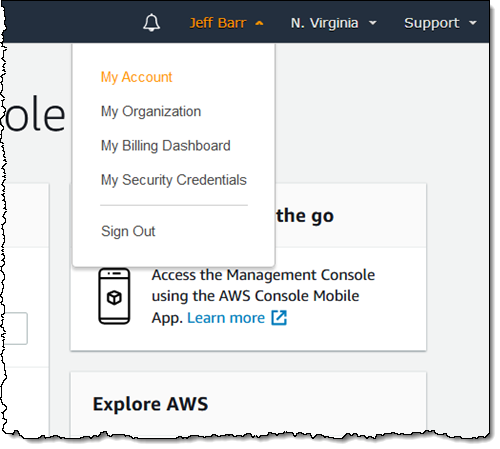
Scroll down to the AWS Regions section, find the new region, and click Enable:
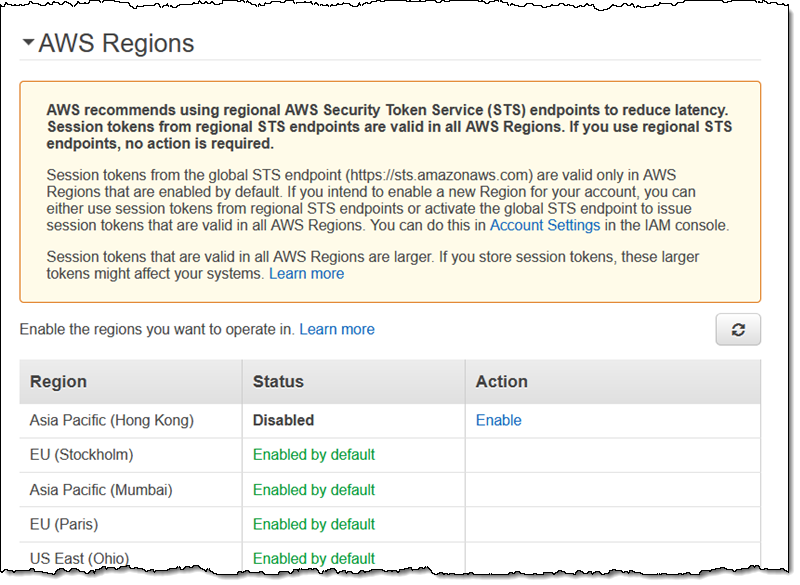
Then confirm your action by clicking Enable region:
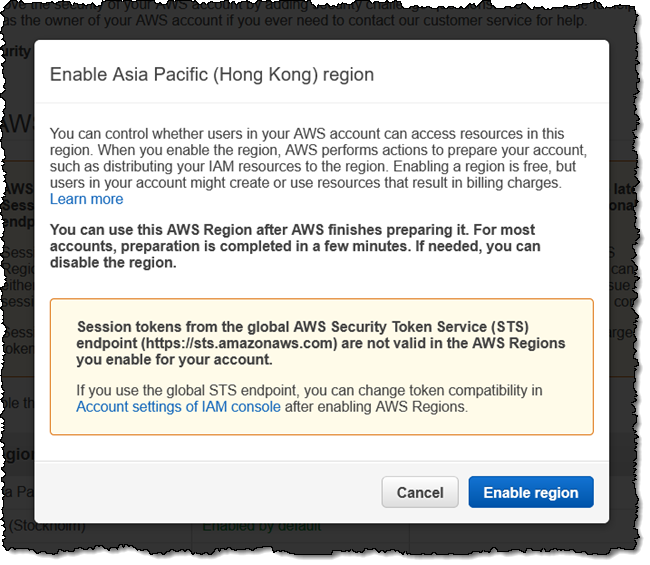
The region is enabled immediately, and will be ready for use shortly thereafter.
You can also enable the region by selecting it from the menu:
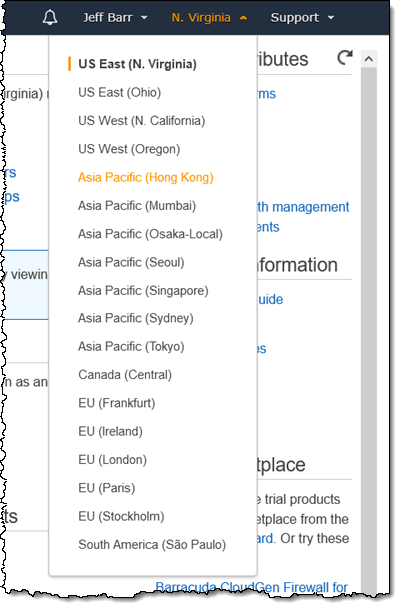
And then confirming your action:
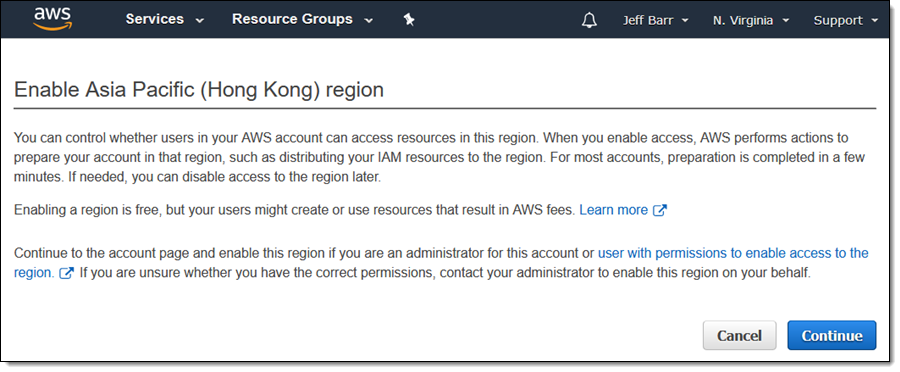
Connectivity, Edge Locations, and Latency
Hong Kong SAR is already home to three Amazon CloudFront edge locations (the first one opened way back in 2008). There are also more than thirty other edge locations and eleven regional edge caches in Asia; see the Amazon CloudFront Infrastructure page for a full list.
The region offers low-latency connections to other cities and AWS regions in the area. Here are the latest numbers:
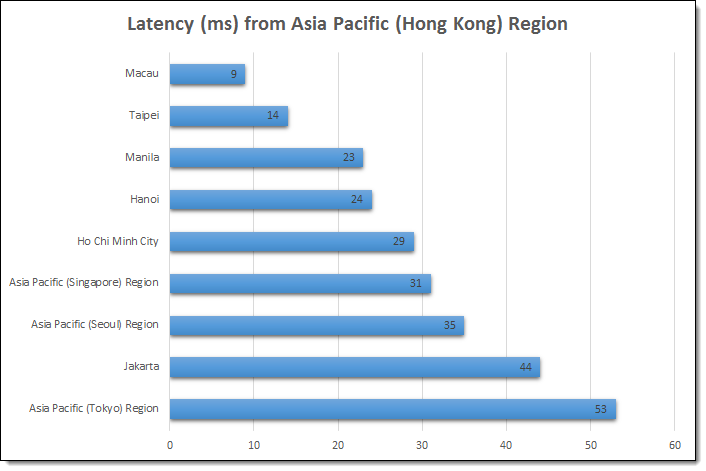
There are now two Hong Kong AWS Direct Connect locations: the existing one at iAdvantage Mega-I and a new one at Equinix HK1. Both locations have direct connectivity to the Asia Pacific (Hong Kong) Region. If you already connect to AWS at iAdvantage, you can use your existing Direct Connect connection to access the new region via Direct Connect Gateway.
Investing in the Future
Before I wrap up I would like to tell you about some of work that we are doing to support startups and to educate developers:
AWS Activate – This global program provides startups with credits, training, and support so that they can build their businesses on AWS.
AWS Educate – This global program teaches students about cloud computing. It provides AWS credits to educators and students, along with discounts on training, access to curated content, personalized learning pathways, and collaboration tools. Dozens of Hong Kong universities and business schools are already participating.
AWS Academy – This global program is designed to bridge the gap between academia and industry by giving students the knowledge that they need to have in order to qualify for jobs that require cloud skills. The program is built around hands-on experience, and includes an AWS-authored curriculum, access to AWS certification, accreditation for educators.
Training and Certification – This global program helps developers to build cloud skills using digital or classroom training and to validate those skills by earning an industry-recognized credential. It includes learning paths for Cloud Practitioners, Architects, Developers, and Operations.
— Jeff;
